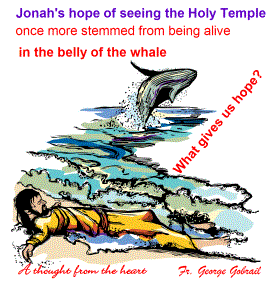Author Archives: Fr. Guirguis
يونان
Satan’s gift
عطية الشيطان
الأتضاع
” اتضعوا قدام الرب فيرفعكم “
(يعقوب 10:4)
وأنا أتأمل فى عبارة ” اتضعوا ” وفي ماذا تعنيه، وجدت الروح يقتادنى إلى معنى واحد وهو أن يعترف الانسان بخطئه. وإذا بى أتقابل مع شاول الملك وصموئيل النبى فى صموئيل الأول الإصحاح 13. فى مواجهة قوية قال صموئيل لشاول الملك ماذا فعلت ؟ نظرت إلى شاول الملك منتظرا أن يعترف بخطئه ، ولكنه قدم عذرا وتبريرا فيما فعل ولم يقل أخطأت فكان هذا الرد الصعب من صموئيل ” قد انحمقت ” . تركتهم ومضيت فى طريقى وأنا حزين على شاول لأنه لم يتضع ليعترف بخطئه.
لكن يا نفسى لماذا تنظري إلى شاول وكأنك لم تكونى شاول فى يوم من الأيام، ليس لمرة واحدة بل لمرات فى عمرك ، فكم كان يحلو لك أن تبررى لنفسك فيما تفعلى، أحيانا فى هدوء بالحجة والمنطق كما فعل شاول وتظنى أن من سمعك صدق ما قلته واحترم فيك كبريائك وتبريرك ولكن الحقيقة أنهم يتركونك وهم يقولون فيما بينهم ” لقد انحمقت هذه النفس “
وعد الكتاب حلو لكل من يريد أن يتضع ولكن الذات تخيفه بأنه سيصير مرذولا فى أعين الناس ، هذا الوعد ” أتضعوا …. فيرفعكم ” . يحضرنى هذا الاختبار الذى جزت به فى عام 2013. غار الشيطان منى ومن الخدمة التى باركنى الرب بها بنعمته فأوقعنى فى الخطية وشهر بى إلى أقصى درجة حتى أنه ذهب ليقول لشعب كنيستى ما معناه أننى إنسان شرير واستحق أكثر مما عوقبت به. وإذا به يرى الشعب, بعد أن أنتهى من حربه الشنعاء التى شنها ضدى, يتكلمون عن فضائل وعن خدمات استخدمنى الله فيها فكان فى صدمة . هذا حدث لأن الشيطان لم يعرف أننى اعترفت لكل من زارنى بأننى أخطأت وأننى أستحق العقاب مؤمن بوعد الرب :
” اتضعوا قدام الرب فيرفعكم “
The Foot Washer
“He poured water into a basin, and began to wash the disciples’ feet, and to wipe them with the towel with which he was girded”
(John 5:13)
We went on a mission trip to Kenya in the summer of 2009. While we were there, we celebrated the feast of the Apostles on July 12th. During the Liturgy of the Apostle’s feast, we fulfill the rite of washing the feet. I prayed the liturgy there, and practiced the rite of washing the feet of the congregation. Everyone attending was from the city there. They all came with bare feet or wearing slippers. The roads in Kenya are unpaved and dusty. I sat on the floor to wash their feet from the dust of the road. It was as if I was practicing this rite for the first time. Every time during my priesthood years in Egypt or America, I would just anoint the feet of the people, and their feet were always clean because they were wearing socks and shoes. When I finished the washing of the feet for the Kenyan congregation, the floor of the church where I washed their feet was all muddy (dust and sand mixed with water). I looked at this muddy floor and I rejoiced because the floor was dirty, but their feet were clean.
This realization took me to the scene where Jesus sat on the floor to wash the feet of His disciples. I contemplated in the Foot Washer, Our Lord Jesus, who washed the disciples from cowardness (Peter), doubt (Thomas), from failing in the test of faith (Philip in feeding the crowd), and from fear (all the disciples at the cross).
Our Lord Jesus Christ asked us to wash each others feet. I wonder how many of us are true foot washers or how many of us are truly willing to wash feet? How many of us are willing to sit in a muddy place, whereas all who come to are left clean?
It is not easy, but I pray for my weakness, for the church, for the servants and the shepherds all over the world so that we can all practice this great service. “the service of washing the feet.” And there is no one to learn from except
“The true Foot Washer, Our Lord Jesus Christ.”
غاسل الأرجل
” صب ماء فى مغسل وابتدأ يغسل أرجل التلاميذ ويمسحها بالمنشفة التى كان متزراً بها ”
(يو 5:13)
ذهبنا فى رحلة تبشيرية فى صيف عام 2009 إلى كينيا وبينما كنا هناك احتفلنا بعيد الرسل الذى يوافق 12 يوليو. فى طقس قداس عيد الرسل نتمم طقس غسل الأرجل وقد صليت القداس هناك ومارست طقس غسل الأرجل للشعب الحاضر القداس وهم كلهم من أهل المدينة . كانو كلهم حفاة أو يرتدون (الشباشب) وطبيعة الطرق هناك ترابية وغير مسفلتة . جلست على الأرض لأغسل أقدامهم من تراب الطريق وشعرت وكأننى ولأول مرة أمارس هذا الطقس لأنى فى كل مرة خلال سنوات الكهنوت سواء فى مصر أو في أمريكا كنت فقط أرشم القدم ولشعب أرجله نظيفة أفراده يرتدون شرابات وأحذية . حينما انتهيت من غسل أرجل الشعب فى كينا كانت أرضية الكنيسة فى المكان الذى غسلت فيه أرجلهم عبارة عن وحل وطين (تراب ورمل ممتزج بالماء) نظرت إلى الأرض الموحلة بالطين وفرحت ، فرحت لأن الأرض موحلة ولكن أرجلهم صارت نظيفة.
هذه الحادثة أخذتنى إلى هذا المشهد حينما جلس يسوع على الأرض ليغسل أرجل التلاميذ وتأملت فى غاسل الأرجل الرب يسوع الذى غسل التلاميذ من الجبن (بطرس) ومن الشك (توما) ومن السقوط فى امتحان الإيمان (فيلبس ف إشباع الجموع) ومن الخوف (كل التلاميذ عند الصليب)
رب المجد يسوع سألنا أن يغسل بعضنا أرجل بعض ولكن أتساءل كم واحد منا بالحقيقة غاسل أرجل أو مستعد أن يكون غاسل أرجل ؟ من منا مستعد أن يجلس فى مكان موحل بينما كل من أتى إليه يذهب من عنده نظيفا ؟
ليس الأمر هين ولكنى أصلى من أجل ضعفى ومن أجل الكنيسة ومن أجل الخدام والرعاة فى كل العالم أن نتحلى بهذه الخدمة العظيمة ” خدمة غسل الأرجل ” وليس لنا أن نتعلم إلا من:
” غاسل الأرجل الحقيقى رب المجد يسوع “
Do Not Harden Your Heart
“If there is among you a poor man of your brethren, within any of the gates in your land which the Lord your God is giving you, you shall not harden your heart nor shut your hand from the poor brother.” (Deuteronomy 15:7)
I went to the book of Ruth, and there I found myself interested in a conversation by three women talking (Ruth 1:8). I stood still because I wanted to see how the conversation was going to end. I heard Naomi saying to her two daughters-in-law: “Go back.” (Ruth1:11). I said to myself this makes sense; Naomi is an old woman and she does not have any more sons to offer as husbands. She has nothing in this foreign country. And then Naomi confirmed what I was thinking about. This thought was reason and logic.
Surely there was no need or justification for the daughters to go with her since they are not Israelites. They do not know the tradition of the Israelites and Naomi is not a wealthy woman by where the men of Israel would find attraction to take any of her daughters-in-law as wives. And as I followed the current talk between them I saw Orpah kissing her mother-in-law and returning back to her parent’s house. I said to myself she did the right thing using logic and reason. What then came to my attention is Ruth did not do the same as Orpah, but insisted to stay with her mother-in-law. I found myself in front of a scene in which I could not stay silent. I felt Ruth was being unreasonable; how could she go with a poor old woman who was unable to take care for herself?
I whispered in Ruth’s ear and said: “Think a little bit about what you are intending to do, this old woman is poor and has to be dependent on anyone in which she can rely. No one can afford this old woman’s expenses.”
Ruth turned to me and said: “Do you not believe in the God of Israel?” I said with confidence: “Of course I believe in the God of Israel.”
She said again: “Did he not tell you if you see your brother in need, you shall not harden your heart?”
I answered: “Yes, He said this, but this commandment is hard just like other commandments that are hard to accomplish.”
She said: “This commandment is not hard nor is any commandment hard, but your heart is hardened and tough. Then she said “Do not stop me from going with her.” She left me to continue her conversation with her mother in-law with persistence.
I looked down and fled, while I felt sorry for myself and my harden heart. I sighed and prayed that God would give me a softened heart to have pity when I see the needs of my brother and do not to hinder myself.
“And I do not harden my heart later on”
لا تُقسى قلبك
” إن كان فيك فقير أحد من إخوتك فى أحد أبوابك فى أرضك التى يعطيك الرب إلهك لا تقسى قلبك ولا تقبض يدك عن أخيك الفقير ” (تث 7:15 )
ذهبت إلى سفر راعوث وإذا بى أنجذب إلى حديث أولئك النساءالثلاث (راعوث 8:1 ) وإذ شدنى هذا الحوار وقفت لأتابع كيف سينتهى . سمعت نعمى تقول لكنتيها ” إرجعا ” (عدد 11) ، قلت فى ذهنى هذا الكلام معقول فهى إمرأة عجوز وليس لديها أولاد آخرين لتعطيهما أزواجا ولا تملك شىء فى هذا البلد الغريب . وإذا بنعمى تقول تماما ما فكرت فيه . هذا هو المنطق والعقل. بالطبع ليس هناك داع ولا مبرر ان يذهبا معها وهما ليستا إسرائيليات ولا يعرفا عادات وتقاليد هذا الشعب ونعمى ليست إمرأة ثرية كى ينجذب رجال إسرائيل لكنتيها ويأخذاهما زوجات لهم . وإذ أتابع الحديث الجارى بينهن رأيت عرفة تقبل حماتها وترجع إلى بيت أهلها فقلت فى نفسى قد فعلت الصواب وتصرفت بالعقل والمنطق . لكن ما لفت إنتباهى أن راعوث لم تفعل مثلما فعلت عرفة بل ألحت على حماتها أن تبق معها . وجدت نفسى أمام هذا المشهد لا أستطيع أن أقف صامتا وأنا أرى راعوث تتصرف بغير عقل ، كيف تذهب مع إمرأة عجوز فقيرة غير قادرة على أن تعول نفسها ؟ همست فى إذن راعوث وقلت فكرى قليلا فيما تنوي أن تفعلى، هذه المرأة العجوز فقيرة وهى عالة على أى إنسان ولا يستطيع أحد أن يتكفل بمصاريفها. فالتفتت إلى راعوث وسألتني: ألا تؤمن بإله إسرائيل ؟ قلت وبكل ثقة طبعا أؤمن بإله أسرائيل. قالت لي ألم يقل لك إن رأيت أخوك محتاج لا تقسى قلبك ؟ قلت نعم قال هذا ولكن هذه الوصية صعبة مثل وصايا أخرى صعب أن ننفذها قالت: ليست هذه الوصية صعبة ولا أى وصية صعبة ولكن قلبك هو قاسى وصعب، ثم قالت: لا تعوقنى على أن أذهب معها وتركتنى لتتابع حديثها مع حماتها وإلحاحها عليها.
نكست رأسى ومضيت وأنا آسف على نفسى وعلى قلبى القاسى وتنهدت وصليت أن يعطينى الله قلبا مترفقا حانيا يبصر احتياجات أخى ولا أمتنع عنه
” ولا أقسى قلبى فيما بعد “




